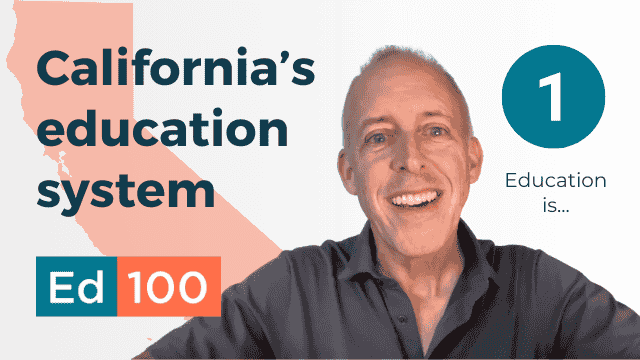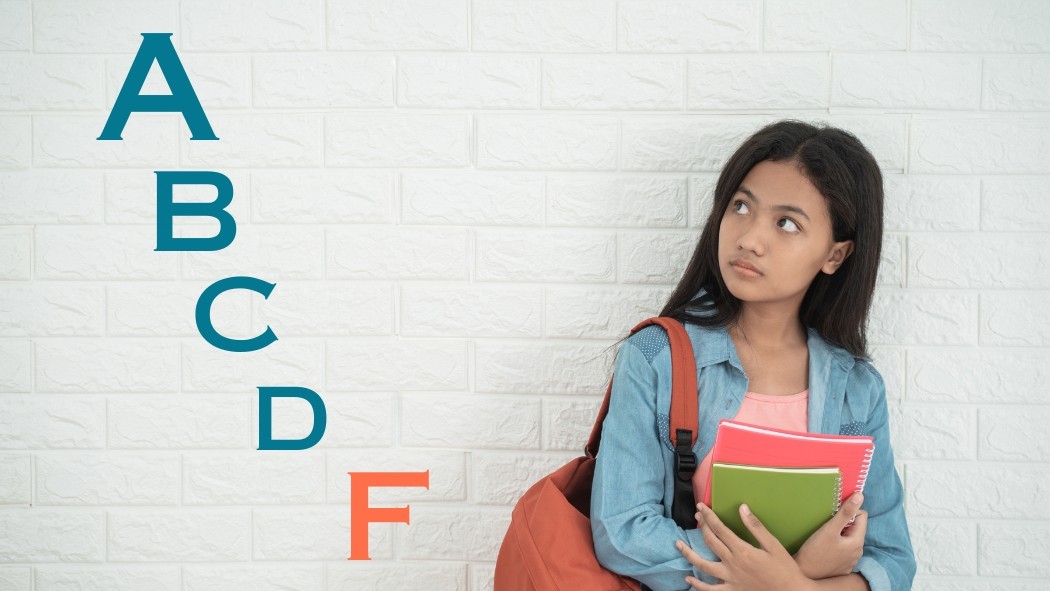
Most Americans, when asked, express doubts about the overall quality of public schools. They tend to think more highly of their own schools, though. And their own kids' education? No problem.
In This Lesson

Has public confidence in schools changed over time?
Are Californians confident of their schools?
Are communities confident of their schools?
Are parents realistic about their kids' school success?
What fraction of kids will go to college?
Is grade inflation real?
Do standardized test scores matter?
Are report cards bad?
What is choice-supportive bias?
▶ Watch the video summary
★ Try the chapter Discussion Guide
Wishful thinking is human nature. Unfortunately, problems are hard to address if you think everything is OK.
And who wants to tell you otherwise? From gentle, ambiguous feedback in parent-teacher conferences to systemic grade inflation, the education system suffers from a lack of candor. It's a huge challenge.
Nationally, people are worried about the quality of education
"I think the system is broken, but…"
Americans are broadly concerned that their education system isn't working very well. Gallup, the polling company, reports that national confidence in public institutions peaked in 1975 and has fallen dramatically since then. Public education is very much part of this trend.
Californians are concerned, too.
California fits this pattern. In a 2025 poll of likely voters, the Public Policy Institute of California (PPIC) found that just 13% of Californians felt the quality of education in public schools was “not much of a problem”. The rest thoughtit was a “big problem” or “somewhat of a problem”.
People have more confidence in their local schools
"…I guess my school's OK, right?"
Beneath this big-picture concern about the overall quality of public education lies a paradox: parents generally tend to think somewhat better of their local schools.
The same PPIC survey asks Californians to give their local schools a letter grade. Nearly half of public school parents give their local schools an A or B.
Parents believe their kids will succeed in college
"Anyway, my kid's doing well enough"
When it comes to their own kids' prospects, parents tend to be blinded by optimism. It's a natural bias. Parents want to believe the best about themselves, after all, including the belief that they are good parents.
Learning Heroes, a non-profit organization, commissioned research that shines light on this harmful cognitive error. Through surveys conducted in multiple years, including parents from different backgrounds, they found that a huge percentage is under the impression that their kids will finish high school, advance directly to college, and graduate.
Most kids don't go to college
These hopes are way out of line with reality. About a tenth of students don't finish high school. Of those who do, only a fraction pass the college-track courses they need to apply for a four-year college. Based on recent trends, about a third of California students will go on to earn a college degree, with huge variation by race/ethnicity and gender. For example, Asian girls are more than five times as likely to become college graduates as Black boys.
Grade inflation is real

In the Ed100 blog
How should students be graded?
Over time, average grades for high school students have risen for all course types, from electives to advanced academic courses.
The average grade point average in high school has floated upward from a C-plus to a B-minus. For non-academic subjects, a grade of B is now average.
Part of this increase can be seen as authentic. Over decades, average scores on statewide standardized tests have improved a bit, which suggests that today's average students are probably learning somewhat more than their predecessors did.
But this certainly isn't the whole story. The bigger issue is that teachers, like most people, would prefer to deliver positive encouragement rather than hard knocks.
Standardized tests keep the system honest
Standardized tests play a crucial role in keeping the education system honest. Without excuses, they deliver straightforward information to parents about kids' learning progress relative to grade-level expectations. These scores are the clearest, most honest way to tell if your student is on track, academically, and they deserve unflinching attention.
Both California and the federal government pay attention to these scores. They use patterns of test score improvement (well, actually the lack of it) to quietly direct resources to the five percent of schools most desperately in need of intervention.
Oddly, parents and teachers often tend to shy away from test scores. It's human nature to hear what you want to hear, and to look at what you want to see. Is it any wonder that parents might prefer to draw conclusions about how their kids are doing from grade-inflated report cards and cordial parent-teacher conferences, rather than from their kids' scores on standardized tests?
Choice-supportive bias
Rightly, parents feel responsible for the decision to enroll their children at the school they attend. Wrongly, this decision leads to a form of wishful thinking known as choice-supportive bias. Communities whose schools have been chronically ineffective nevertheless give their schools passing grades, for example, or resist efforts to make significant changes.
California has tried various approaches to "raise the bar" for learning expectations. For a decade, all students had to pass the California High School Exit Exam (a test of basic skills) to earn their high school diploma. Much too easy for most students, it was scrapped in 2015. In a triumph of wishful thinking, more than half of the students who repeatedly failed the test nevertheless still said in surveys that they expected to go to college. In the movie Waiting for Superman, Davis Guggenheim colorfully points out the huge gap between American students' confidence and their results.
The disconnect between self-perception and reality is human nature. Virtually everyone sees themself as an above-average person. Teachers and parents rate themselves as above-average, too, and extend their beliefs about themselves to the students in their care, like a nation of Lake Wobegon kids. Unfortunately for kids, in this case, human nature doesn't serve them well.
Standardized test scores deserve your unflinching attention.
Standardized tests based on grade-level standards are the education system's defense mechanism against wishful thinking, including grade inflation. Love them or hate them, these tests deliver straightforward information about your child's actual learning progress. These scores deserve unflinching attention. They are the clearest, most honest way to tell if your student is on track, academically.
Updated June 2025
Quiz×
CHAPTER 1:
Education is…
-
Education is…
Overview of Chapter 1 -
California Education
Are California’s Schools Really Behind? -
American Education
Are U.S. Schools Behind the World? -
Education and the Economy
Schools for Knowledge Work -
Educational Failure
The High Social Costs of Bad Apples -
Grade Inflation
Wishful Thinking and Cognitive Bias -
Are Schools Improving?
Progress in Education -
History of Education
How have Schools Changed Over Time? -
Purpose of Education
What are Schools For, Really?
Related
Sharing is caring!
Password Reset
Search all lesson and blog content here.
Login with Email
We will send your Login Link to your email
address. Click on the link and you will be
logged into Ed100. No more passwords to
remember!














Questions & Comments
To comment or reply, please sign in .
Anvi Kevany2 August 20, 2025 at 7:28 am
Maria Campos July 24, 2025 at 3:32 pm
Jeff Camp - Founder July 25, 2025 at 12:06 am
Darla Williams June 4, 2025 at 8:12 pm
Justice Landes February 1, 2024 at 3:43 pm
Carol Kocivar June 13, 2022 at 6:43 pm
California confidence in public schools drops according to 2022 polling by UC Berkeley.
https://escholarship.org/uc/item/1gz0n3nx
francisco molina August 12, 2019 at 11:26 pm
Mostly of their problems are hard to resolve inside the classroom, many of them come from families with low education and low salaries and the presence of the counselor make a big difference .
Brenda Etterbeek May 11, 2019 at 7:20 am
Jeff Camp May 20, 2019 at 4:34 pm
Brenda Etterbeek May 10, 2019 at 6:41 pm
Namrata Mundhra February 25, 2019 at 8:50 am
Caryn February 25, 2019 at 11:09 am
Jeff Camp - Founder August 2, 2017 at 8:45 am
Carol Kocivar July 19, 2017 at 3:24 pm
One takeaway: Perception changes depending on how success is measured.
"Current data systems, which consist primarily of standardized-test scores, misrepresent school quality. They say more about family income than they do about schools. And they say very little about the many things that good schools do."
Jeff Camp - Founder April 3, 2017 at 4:38 pm
wtgoddess May 31, 2015 at 5:48 am
wtgoddess April 7, 2015 at 5:57 am
jenzteam February 27, 2015 at 6:48 am
Jeff Camp - Founder February 27, 2015 at 4:12 pm
Jeff Camp - Founder January 10, 2015 at 10:29 am
His net advice: differences in expectations make "attitude" questionnaires a poor tool for comparing schools.
celia4pta September 25, 2014 at 9:06 pm
Twenty years ago my sister in another state was complaining about her daughter's "large" class of 19 when my child was in a class of 35. And it has not exactly gotten better since.
We are trying not to blame our local educators or add to the "Schools Suck Industry" that John Mockler likes to refer to.
It seems like we end up with a "damned if you do, damned if you don't" situation. If schools are not doing well, then politicians and a certain segment of the population say, "Why throw money at a failing system." If schools are succeeding, why give more resources? The schools are seen as efficient. (See the Orange County Register for calculations on efficient use of school funds.)
Either way, the answer is the same: no additional resources.
Celia
Sherry Schnell January 22, 2015 at 9:25 am
anamendozasantiago February 5, 2015 at 5:27 pm
This gifted school receives around 400 application of qualified students but they only allow 60 students in. What a waste of wonderful, talented minds.
Jeff Camp - Founder February 5, 2015 at 6:21 pm
Brandi Galasso February 7, 2015 at 8:06 pm
Caprice Young March 7, 2011 at 12:41 am
In some neighborhoods, though, there aren't any good choices. In South Los Angeles, for example, a group of local parents and educators took stock of their local schools and didn't like what they saw. Fifty percent and higher dropout rates for African American students, illiteracy extending into high school, and unsafe school environments, drove them to create the Inner City Education Foundation public schools. ICEF is committed to educating all students to the highest levels, ensure that every one graduates, gets accepted to a top college and is competitive once there. With a 97 percent graduation rate, a 100 percent college going rate, with 90 percent of graduates attending four year colleges and with 90 percent still in school and on track-- ICEF parents are proud of the schools they created.
It may seem extreme to start your own public schools, but if your current choices can't get the job done, parents and educators now have the ability to take matters into their own hands. Getting educated about education as a parent or student is the best way to start holding our schools accountable for ensuring that our kids can compete successfully in the global economy.